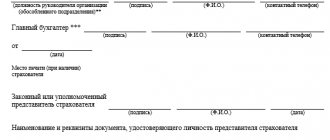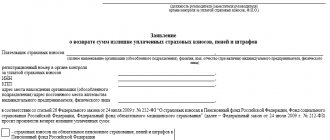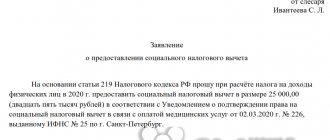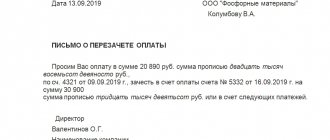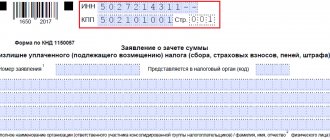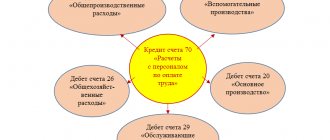Issues discussed in the material:
- What is the procedure for returning insurance premiums?
- How to return insurance premiums to individual entrepreneurs
- Is it possible to sue the Social Insurance Fund if contributions are calculated incorrectly?
- How to process refunded insurance premiums
Many entrepreneurs and their accountants often wonder how to return insurance premiums? This attention is caused by changes in legislation. The fact is that until 2021, contributions were paid to the Social Insurance Fund and the Pension Fund of the Russian Federation, but now they are transferred to the tax authorities. Accordingly, the procedure for returning insurance premiums will depend on the year in which they were paid. In our article we will talk in detail about all the nuances relating to this issue.
Who should return the fee?
Contributions are divided into different types. The type of payment determines who should return it:
| Type of contribution | Until January 1, 2021 | From January 1, 2021 |
| OPS, compulsory medical insurance | Pension Fund | Inspectorate of the Federal Tax Service |
| FSS | FSS | Inspectorate of the Federal Tax Service |
There is also such a contribution as a contribution in case of injuries and accidents. The FSS was responsible for it until 2021 and is now responsible.
IMPORTANT! There is no refund of overpaid pension contributions.
Payment refund nuances
Overpayment of contributions is refunded only if a number of conditions are met:
- There are no arrears or debts on contributions. If there are arrears, then the overpayment first goes to repay them. And the remaining funds are transferred to the company's account.
- The overpayment can also be applied towards future payments.
- Funds contributed to the funds before 2021 do not count towards future payments. The reason is the transfer of control functions to the Federal Tax Service.
If you need to receive money from the fund, you must send a corresponding application to the territorial department.
Refund of overpayments incurred before the 17th year
Until 2017, the function of accepting insurance payments belonged to extra-budgetary funds. That is, to get a refund of the overpayment, you need to go to these funds. The request can be made in these forms:
- In person or with the help of a representative. You need to come to the territorial department of the desired fund (FSS or Pension Fund) and submit an application. If it is transferred by a representative, then the paper must be notarized. The advantage of this option is getting results in the shortest possible time. The downside is that you have to go to the fund.
- Via mail. You need to send a registered letter with a list of attachments and notification of receipt. Pros: You don’t need to come to the fund in person. The downside is that it takes time to deliver the letter.
The Fund must consider the application within 10 days. His representatives, if a decision is made to return, send the approved document to the Federal Tax Service. And the Federal Tax Service returns the overpayment.
Refund of overpayments incurred since 2021
Algorithm for returning funds sent to the Federal Tax Service:
- Reconciliation of calculations. Needed to determine the size of arrears, if any. Their exact volume must be specified in the application.
- Directing the overpayment to pay the arrears. The overpaid amounts are offset. It is carried out by the Federal Tax Service.
- Submitting a return request. An application is drawn up according to f. KND 1150058.
- Sending the application to the Federal Tax Service department. You need to go to the authority at the place of registration or registration of the legal entity/individual entrepreneur. The application can be sent by mail.
Tax payments are refunded using the same scheme.
The overpayment is returned to the organization's account. Therefore, this account number must be written down in the application. If the funds are returned to the individual entrepreneur, they are sent to the account used for commercial work.
Refund of insurance premiums: terms
As a general rule, the return of contributions administered by the Federal Tax Service is possible within 3 years from the date of the overpayment (clause 7 of Article 78, clause 3 of Article 79 of the Tax Code of the Russian Federation). But if you miss it, you can try to restore the right to return in court. Courts may be loyal to not too long missed deadlines, which are due to different approaches of the Federal Tax Service and the taxpayer to establishing the starting point of its countdown (for example, the decision of the Arbitration Court of the Oryol Region dated July 4, 2018 in case No. A48-2866/2018).
The deadlines for the return of overpayments on insurance premiums, which are administered by the Federal Tax Service, are similar to those established for taxes. The amount of the overpayment of the contribution is subject to refund within 1 month after receipt of the application by the Federal Tax Service (clause 6 of Article 78, clause 5 of Article 79 of the Tax Code of the Russian Federation). Within 10 days after receiving the application, the tax authorities make a decision on making a refund (clause 8 of article 78, clause 2 of article 79 of the Tax Code of the Russian Federation). Moreover, if a desk audit is carried out on a contribution that was overpaid, the decision on return is made no earlier than 10 days after its completion (clause 8.1 of Article 78 of the Tax Code of the Russian Federation).
Return Application
The application is drawn up strictly according to form 1150058, approved by Federal Tax Service Order No. ММВ-7-8/ [email protected] This form is used when the application is sent to the Federal Tax Service. It contains this information:
- TIN and checkpoint.
- Application number.
- Tax authority code.
- The article on the basis of which the refund is made.
- Reason for return.
- The amount of overpayment that needs to be returned.
If the application is sent to the Pension Fund, then it is executed according to f. 23-PFR. If the application is sent to the FSS, then f. 23-FSS, established by FSS order No. 457 of November 17, 2021.
Wiring used
Money received as a result of the return of an overpayment must be taken into account. They are recorded on account 69. In particular, these postings are used:
- DT69 KT51. The posting is recorded when the contribution is paid. Overpayments are reflected in debit.
- DT51 KT69. Return.
Overpayments that are not recorded as expenses when establishing the tax base are not considered non-operating income.
Interest on late transfer of refund
The Federal Tax Service and the Social Insurance Fund may be late with the return of insurance payments. In this case, the company can present the amount of interest determined depending on the size of the late payment and the duration of the delay itself. The amount of interest is determined by the standard formula used when establishing penalties:
Amount of overpayment * number of days of delay * 1/300 of the refinancing rate
The interest rate can be set only when the money has arrived in the company’s account. This is due to the fact that the amount of the penalty depends on the length of the delay. The corresponding calculation rules are established by Part 9 of Article 27 of Federal Law No. 212 dated July 24, 2009. The money is transferred by the Treasury of the Russian Federation on behalf of the funds.
IMPORTANT! Government agencies must return the money to the organization’s account. Funds accrued as late interest cannot be offset against future payments.
Example
The company overpaid contributions by 2,700 rubles. An application for a refund was sent. They were supposed to arrive on February 10th, but in fact they only arrive on February 20th. The company makes these calculations:
- Number of days of delay – 10.
- Percentage: 2,700 * 10 * 1/365 * 9%. = 6.66 rubles.
Interest will be accrued from the date that is the last day of transfer of the overpayment.
Refund of overpaid contributions in pre-trial procedure
If there is overpaid money, the regulatory authorities in most cases return it to the applicant. This procedure is almost the same when applying to the Federal Tax Service, Social Insurance Fund or Pension Fund.
Refunds are made based on the policyholder’s application to the Pension Fund. It should be noted that if the organization has fines or debts, the funds will be returned only after part of them is offset against their repayment.
In addition, the law provides for the possibility of offsetting funds that were paid in excess of income.
Thus, it is allowed to offset this amount when making payments of insurance premiums in the future. This is the most common practice. The decision on offset is made by the controlling body independently.
If the payer has fines, penalties and debts, then overpaid funds can be offset against their repayment. Moreover, if the amount of debt is large, then the entire amount of overpaid payments can be used to repay it.
Attention! Refusal to return funds is not permitted if there is a debt the amount of which is significantly less than the amount of excess funds deposited. Refunds must be made based on the policyholder's application after repayment of debts.
Errors that occur when returning an overpayment
The organization must process the refund of the overpayment correctly. Otherwise, she will not receive any money. Let's look at common mistakes made during registration:
- Submitting an application for a refund of amounts paid before the 17th year to the Federal Tax Service. The latter began to be responsible for contributions only from January 1, 2017. Extra-budgetary funds are responsible for payments made before the 17th year. Therefore, the application must be sent specifically to these funds.
- Submitting an application for a refund without specifying the amounts. All amounts are specified through reconciliation of calculations. In particular, the application must indicate the exact amount of the overpayment and the amount of the arrears, if any. If the reconciliation is carried out incorrectly, then a difference is formed between the amount in the application and the amount in the personal account/registration.
- The wrong application form is being used. To draw up an application to the Federal Tax Service and extra-budgetary funds, different forms are used. When choosing a form, you must also take into account what kind of contribution is planned to be returned: for temporary disability or for injury.
All errors lead to a slower return process. If the application is sent to the wrong place, you will have to submit the application again.
About amendments to reporting
If an overpayment relating to 2012 is detected, the accountant will no longer be able to make corrections to the approved statements for this period.
It is not subject to revision, replacement or re-presentation to users (clause 10 of PBU 22/2010). A significant error of the previous reporting year, identified after approval of the reporting for this year, is corrected by recalculating comparative indicators for the reporting periods reflected in the organization’s financial statements for the current reporting year (clause 2, clause 9 of PBU 22/2010). In fact, this means that due to a significant error in 2012, the indicators of retained earnings (uncovered loss) will have to be clarified. Let us recall that currently comparative information in the balance sheet is presented for three periods: the current (in the example, this is 2013), the previous one (2012) and the previous previous one (2011). In this case, data on retained earnings (uncovered loss), reflected in the capital of the balance sheet of the current period, must correspond to the balance of account 84 as of the reporting date, which shows the correctness of the retrospective recalculation of financial statements. Due to an insignificant error, there is no need to recalculate comparative indicators; it is enough to reflect the adjustment in the net profit (loss) of the current reporting period.
